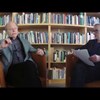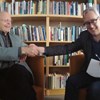nationalstat
Artificial Intelligence, Datafication and Exploring the Minimum Content of Nationality
The Statelessness & Citizenship Review, 6(1), 124-129 COMMENTARY: Introduction Identifying the minimum content of nationality (‘MCN’), the inalienable core elements or conditions of citizenship witho

Liberal Nationalism - What is it? Why do we need it? Gustaf Arrhenius and David Miller
Liberalism and nationalism are in many ways contradictory positions. The ideals of open borders, free movement of people, goods and services, cosmopolitanism and internationalism that are associated w

Liberal Nationalism - What is it? Why do we need it? Gustaf Arrhenius and David Miller
Liberalism and nationalism are in many ways contradictory positions. The ideals of open borders, free movement of people, goods and services, cosmopolitanism and internationalism that are associated w
EU Citizens - Thirty years on. An introduction
Nordisk Socialrättslig Tidskrift/Nordic Social Law Journal 38.2024 Patricia Mindus & Anna-Sara Lind (eds.) Abstract 2023 marked thirty years since European Union citizenship was introduced as the Trea

Tina Askanius
Tina Askanius is Associate Professor in Media and Communication Studies at the School of Arts and Communication, Malmö University, where she is also the co-director of the interdisciplinary research pShe holds a PhD in Media and Communication Studies from Lund University, Sweden, where she defended the thesis in 2012. Her research broadly concerns the interplay between social media and social movements, and she has published extensively on these matters in the context of social and climate justice movements as well as ultra-nationalist and neo-Nazi movements in Scandinavia. At the institute she works in the project .
Bo Rothstein: The Shadow of the Swedish Right
Venue: Institute for Futures Studies, Holländargatan 13, Stockholm, or online. RegisterResearch seminar with Bo Rothstein, Professor of Political Science, University of Gothenburg Abstract In the recent

Bo Rothstein: The Shadow of the Swedish Right
In the recent election to the Swedish Parliament, the Sweden Democrats, a right-wing populist and nationalist Party, gained 20.5 percent of the vote, making it for the first time the second-largest pa
Competition: Your vision of a positive future
The Paris Institute for Advanced Study and the 2100 Fondation in partnership with the Institute for Futures Studiesare launching the first Positive Future competition in order to encourage the elaboration
Rainer Bauböck: Globalization, new technologies and the future of democratic citizenship
Professor of Social and Political Theory, European University Institute. ABSTRACT Liberal democratic citizenship has been shaped by the legacies of Athens (democracy) and Rome (legal rights) but operate between individuals and states. In a Westphalian world, citizenship has both instrumental and identity value. Enhanced opportunities and interests in mobility rights strengthen instrumental interests in multiple citizenship among immigrants, among populations in less developed countries, and among wealthy elites. The latter two trends potentially undermine a genuine link norm and, if they prevail, might replace the Westphalian allocation of citizenship with a global market. New digital technologies create a second challenge to Westphalian citizenship. As has argued, digital identities could provide a global legal persona for all human beings independently of their nationality, and blockchain technologies could enable the formation of non-territorial political communities providing governance services to their members independently of states. Both the instrumental uses of citizenship for geographic mobility and technologies that create substitutes for territorial citizenship are not merely relevant as current trends. They are also advocated and defended normatively as responses to the global injustice of the birthright lottery. I will challenge this idea and argue that liberal democracies should not be conceived as voluntary associations whose membership is freely chosen, but as communities of destiny among people who have been thrown together by history and their circumstances of life. How these foundations of democratic community can be maintained in the context of rising mobility and the digital revolution remains an open question.
War Policies and Migration Aspirations in Russia
Delmi Report 2024:11 Summary This report investigates how migration aspirations within the Russian population have evolved following the full-scale invasion of Ukraine by Russia in 2022. It primarily fo








